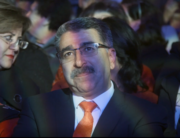Mad as Hell profiles liberal talk show host Cenk Uygur, whose online news show, The Young Turks, seeks to shake up news coverage and reveal the corrupt business of politics. No one is exempt from Uygur’s glaring gaze: not George W. Bush, not Barack Obama.
Director Andrew Napier follows Uygur on his journey through the ups and downs of the talk show business: public access TV, the Internet, and MSNBC. Some might call Uygur narcissistic; he admits as much in the film’s cold opening, saying, “I’ve always had what I think other people would call delusions of grandeur.“
Before watching this film, I’d never heard of Cenk Uygur or his program. When Uygur says that he doesn’t think “anyone else is even close” to what he does as a news host, viewers will wanted to see evidence of what makes him different. However, none of the clips illustrate Uygur’s style to be anything other than loud and strongly opinionated with a grating personality; he’s not afraid to tick other people off. As director, Napier takes a solipsistic approach, letting Uygur and his ego dictate the tone. We hear some outside voices, but these are mainly from Uygur’s friends and family.
Is Uygur really a unique voice in the media? Napier never tries to contextualize Uygur’s boast, nor does he back it up with anything more substantial than two-second clips of The Young Turks, in which we see Uygur complain bitterly about the actions of politicians. However, none of the excerpts seem particularly memorable, or funny. By excluding all other voices, the film seems to paint Uygur as the lone uncorrupted voice on cable TV when he appears on MSNBC, but notably lacking is any mention of Jon Stewart or Stephen Colbert. How can anyone talk about changing the way TV news works without discussing The Daily Show?
The film does not hint at how effective Uygur is at actually influencing issues. Towards the end, Uygur organizes a protest of political action committees, Super PACs, during Occupy Wall Street in 2011. Again, the film makes Uygur out to be the only person who was opposing these groups, but Colbert was also pointing out injustices by creating his own Super PAC. Napier never includes what Uygur’s protest has accomplished or what makes Uygur special, but instead the film focuses on puffy sound bites.
From the shaky camera work to the glaring oversights, none of the film seems particularly well thought out. It seems like Napier was following Uygur around with a camera for a few years and cobbled the footage into some sort of narrative. There might be interest in this film for those who already know and like The Young Turks, but to an outsider, this comes across as just another promotional piece.







Leave A Comment